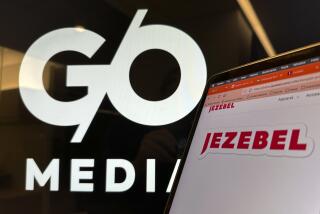Editor Tina Brown is so over the printed word

If Tina Brown is no longer editing magazines, then magazines must be dying.
If Tina Brown is going into the live conference business, then the written word must be dying.
That, at any rate, is the assessment of Tina Brown, who may not always be on the cutting edge, but has the uncanny ability to make you think she is.
What does the future of communication hold? Less writing. More talking.
At a conference in India last week, which was covered by the Hindustan Times, Brown, who is leaving the Daily Beast website at the end of the year, pronounced the death of the very sort of journalism that made her famous.
“You can have more satisfaction from live conversations,” Brown told a gathering at the annual Think conference in Goa. “We’re going back to a completely verbal culture, we’re regressing to the point where the written word will be less relevant.”
Indian journalist Shoma Chaudhury, who was interviewing Brown onstage, was nonplussed.
“To have one of the most iconic editors of the last 40 years saying the word may be dead is for me a dark note to end this session on,” Chaudhury told the audience. “But thank you for listening.”
“Sorry about that,” Brown said.
It’s always entertaining to watch Brown reinvent herself. She may fall flat on her face, as she did with Talk magazine, her 1999 venture with film producer Harvey Weinstein, or her short-lived talk show, or with the late, not-so-great Newsweek, for which she had big plans after it merged with the Daily Beast.
But her early successes -- as editor of Tatler, Vanity Fair and the New Yorker, and as author of a dishy best-selling book about Princess Diana -- ensure that whatever she does next will be of interest to fans and critics alike. Her next venture, Tina Brown Live Media, will produce the inspirational, celebrity-studded Women in the World summits she created while she was at the Beast.
Personally, I was looking forward to her long-planned Hillary Clinton biography. Unfortunately, that project has been iced. Instead, Brown has a contract to write her memoir, Media Beast, due to be published in early 2016.
Shortly after she launched the Daily Beast website in 2008, funded by the deep pockets of media mogul Barry Diller, she bemoaned the fading popularity of long-form narrative journalism, but was bullish as ever on the written word.
“Books are the new magazines,” she told me in a 2009 interview, just after establishing the imprint Beast Books with the publisher Perseus. “There is something about the portability of a short book that is very, very appealing. And of course, you can do it electronically, and you can produce it fast.”
When you declare the irrelevance of the printed word, I suppose you have a vested interest in its demise. And yet in her India talk last week -- “The Crisis in Global Media” -- Brown acknowledged that the news business is still a ticket to power. She noted the recent sale of the Washington Post for $250 million to tech kajillionaire Jeff Bezos of Amazon.
“It’s actually amusing,” Brown told Chaudhury. “These tech guys have completely blown up news and are arrogant, frankly, about stealing everything and making everybody feel passe if they talk about it.”
(Not to be passe, but the Daily Beast has always had a strong aggregation component.)
“Now, of course,” Brown continued, “what they’re finding is they have made these fortunes, they are not as relevant as the people who have the news because they are just other rich guys now. You don’t get a seat at the table unless you have influence. News makes you important. Owning it makes you relevant....
“Even though the Post has become an absolutely sad, drained, demoralized creature, it’s nonetheless the thing that everybody in Washington reads.
“It’s actually amusing to see hard-nosed journalists like Bob Woodward slavering over Jeff Bezos right now as the great Messiah who is going to solve the problem. When I talked to Jeff Bezos last, I don’t think he has a secret ‘open-sesame.’ I suspect he just wants to buy influence in Washington.”
Brown had a few nasty words for what she called “the biggest trend right now in America” -- “native advertising.” The phrase refers to what most people would call “advertorial,” a sneaky piece of advertising disguised to look like journalism.
“It’s a very, very pathetic moment in journalism,” she said.
And an opportune time for Tina Brown to move on. Yet again.
[For the Record, 7:50 a.m. PST Nov. 13: An earlier version of this post incorrectly said Brown parted ways with the Daily Beast website in September. She is leaving at the end of the year.]
ALSO:
LAX shooting suspect upgraded to fair condition
Man admits ‘sextortion’ of Miss Teen USA; lawyer says he’s autistic
Twitter: @robinabcarian
More to Read
Sign up for Essential California
The most important California stories and recommendations in your inbox every morning.
You may occasionally receive promotional content from the Los Angeles Times.











